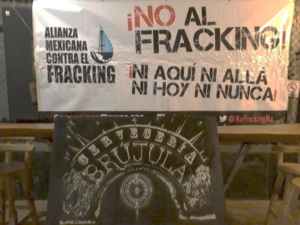 Mexico has been identified as having significant shale oil and gas potential and the Mexican government appears keen to develop its shale resources.
Mexico has been identified as having significant shale oil and gas potential and the Mexican government appears keen to develop its shale resources.
Meanwhile, more and more Mexicans are becoming aware of the dangers of fracking and are mobilizing to oppose plans to sell off clean air and water as well as healthy communities to the incessant greed for profit of big oil and gas companies.
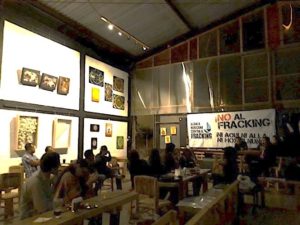 During this year’s Global Frackdown, Mexicans participated in several events that educated people about fracking – and the industry that would harm Mexico’s environment, air and water.
During this year’s Global Frackdown, Mexicans participated in several events that educated people about fracking – and the industry that would harm Mexico’s environment, air and water.
Mexican People Fight Back
Inspired by the Global Frackdown, a group of people met on October 19 in Coatepec, Veracruz to attend a public meeting on fracking.
Over 30 members of LAVIDA (a part of the Mexican Alliance Against Fracking) participated in the event were they discussed conventional and non-conventional hydrocarbon extraction projects in the state of Veracruz with local community members.
A short documentary about the environmental and social impacts of fracking projects and auxiliary infrastructure was presented, followed by an open discussion with the participants. Although the activity was originally set to last a single hour, the active engagement of participants extended the discussion to well over three hours. The audience expressed multiple and very interesting doubts about these extractive projects which were promptly answered by the members of LAVIDA.
At the end, informative materials were handed to attendees with an invitation to spread the word about fracking and its negative impacts among the population of the cities of Xalapa and Coatepec, in Veracruz state.
The interest and active engagement shows that people are taking their future, threatened by oil and gas exploration, in their hands – step by step towards strong people power!
Asking School Kids: What is Fracking?
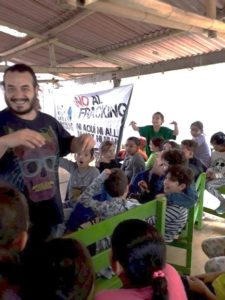 On October 21, members of the Mexican Alliance Against Fracking were invited to the Tlalnecapam Basic School in Veracruz to talk to their students about the environmental and social impacts of fracking. Sixty children, ages 8 to 12, participated in this activity with their teachers. The effects of fracking where presented to the students through videos, drawings, role-playing games and mock up models involving syringes and sand. Teachers committed to follow up on this activity by incorporating a bi-monthly science project on fracking for their students to this year’s curricula.
On October 21, members of the Mexican Alliance Against Fracking were invited to the Tlalnecapam Basic School in Veracruz to talk to their students about the environmental and social impacts of fracking. Sixty children, ages 8 to 12, participated in this activity with their teachers. The effects of fracking where presented to the students through videos, drawings, role-playing games and mock up models involving syringes and sand. Teachers committed to follow up on this activity by incorporating a bi-monthly science project on fracking for their students to this year’s curricula.
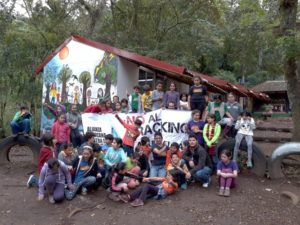 It is crucial to keep informing younger generations about the dangers around fossil fuel extraction. In Veracruz, a group of young engaged people will hopefully go out, defend their communities and tell the world that fracking is not a solution.
It is crucial to keep informing younger generations about the dangers around fossil fuel extraction. In Veracruz, a group of young engaged people will hopefully go out, defend their communities and tell the world that fracking is not a solution.
Farmers and Indigenous Organizations Meet to Discuss the Threats of Fracking
On October 14, the Coordination of Farmers and Indigenous Organizations from Huasteca Potosina, COCIHP, coordinated a meeting of representatives and agrarian authorities of multiple communities from 18 counties in the Huasteca Potosina region. Approximately 350 representatives showed up at the Chimalaco ejido (communal land).
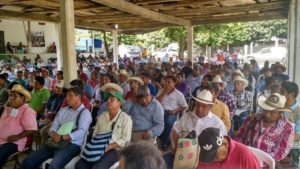 The federal government has announced future bidding rounds with the purpose of granting contracts to private corporations allowing conventional and/or non-conventional hydrocarbon exploration and exploitation activities in the 18 counties in question, representing most of the territory of the Indigenous Náhuatl and Téenek people that inhabit the Huasteca Potosina region.
The federal government has announced future bidding rounds with the purpose of granting contracts to private corporations allowing conventional and/or non-conventional hydrocarbon exploration and exploitation activities in the 18 counties in question, representing most of the territory of the Indigenous Náhuatl and Téenek people that inhabit the Huasteca Potosina region.
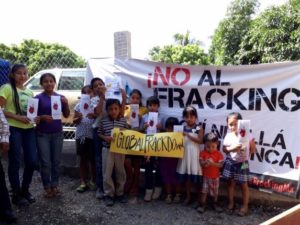 This second annual regional territorial defense encounter represents the culmination of four years of intense grassroots work that has sought to establish a regional network of indigenous and mestizo communities for the defense of land, territory, commons, and human rights. This activity transcended mere informational purposes: round table discussions were set to convene on common objectives and strategies.
This second annual regional territorial defense encounter represents the culmination of four years of intense grassroots work that has sought to establish a regional network of indigenous and mestizo communities for the defense of land, territory, commons, and human rights. This activity transcended mere informational purposes: round table discussions were set to convene on common objectives and strategies.
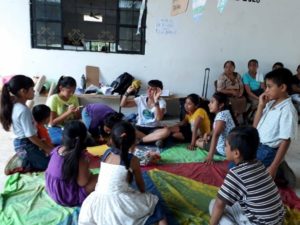 A children’s workshop was also established with the purpose of disseminating information on fracking and its social and environmental impacts among Náhuatl, Téenek, and mestizo children. Activities included territorial mapping and a discussion on water access problems.
A children’s workshop was also established with the purpose of disseminating information on fracking and its social and environmental impacts among Náhuatl, Téenek, and mestizo children. Activities included territorial mapping and a discussion on water access problems.
Grassroots movements play a key role in building resistance against profit-driven fossil fuel projects. Let’s hope this important step uniting grassroots groups will continue and lead to a solid path of people-led opposition to fracking.


